浙江省台州市2020年高三英语冲刺课讲义
2020版高考英语精准备考一轮浙江专用版讲义:Book 4 Unit 2
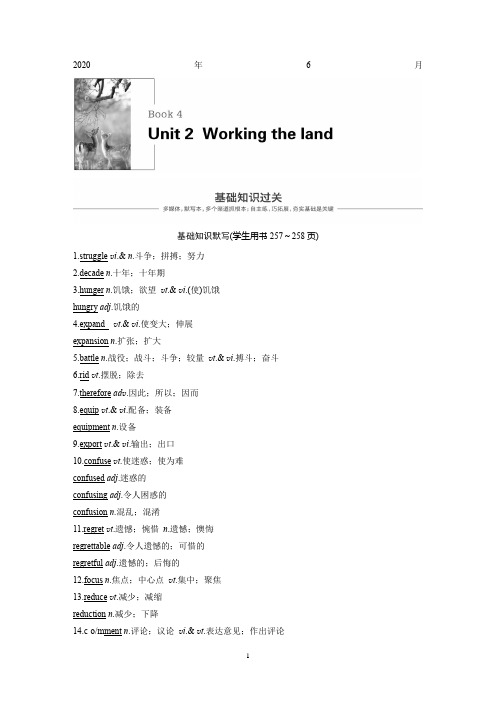
2019年4月基础知识默写(学生用书257~258页)1.struggle v i.& n.斗争;拼搏;努力2.decade n.十年;十年期3.hunger n.饥饿;欲望v t.& v i.(使)饥饿hungry adj.饥饿的4.expand v t.& v i.使变大;伸展expansion n.扩张;扩大5.battle n.战役;战斗;斗争;较量v t.& v i.搏斗;奋斗6.rid v t.摆脱;除去7.therefore ad v.因此;所以;因而8.equip v t.& v i.配备;装备equipment n.设备9.export v t.& v i.输出;出口10.confuse v t.使迷惑;使为难confused adj.迷惑的confusing adj.令人困惑的confusion n.混乱;混淆11.regret v t.遗憾;惋惜n.遗憾;懊悔regrettable adj.令人遗憾的;可惜的regretful adj.遗憾的;后悔的12.focus n.焦点;中心点v t.集中;聚焦13.reduce v t.减少;减缩reduction n.减少;下降14.c-o/mment n.评论;议论v i.& v t.表达意见;作出评论15.statistic n.数据;统计;统计数字;统计资料16.output n.产量;输出17.nutrition n.营养;滋养;食物18.mineral n.矿物;矿石19.root n.根;根源20.underline v.画底线标出;强调21.circulate v t.& v i.循环;流传circulation n.循环;流通22.occupation n.工作;职业;占领occupy v t.占据;占领23.discovery n.发现;发觉discover v t.发现24.summary n.总结;摘要;概要summarize v.总结25.disturbing adj.引起烦恼的;令人不安的disturb v t.打扰disturbance n.困扰;打扰;骚乱26.nationality n.国籍national adj.国家的;民族的nation n.国家;民族27.chemical adj.化学的;关于化学的chemist n.化学家chemistry n.化学28.thanks to幸亏;由于;因为29.rid...of使……摆脱或除去30.be satisfied with对……感到满意31.build up逐渐增强;建立;开发32.lead to导致;造成(后果)33.in addition另外34.focus on集中(注意力、精力等)于35.reduce by减少了……36.be rich in盛产37.keep...free from/of使……免受(影响、伤害等);使……不含(有害物)38.If so,what did you do to grow them?如果是这样的话,你是怎样种植这些植物的?39.Yuan Longping grows what is called super hybrid rice.袁隆平种植的是被称为“超级杂交水稻”的稻种。
阅读理解专题:浙江省台州市2020年高三英语冲刺课讲义
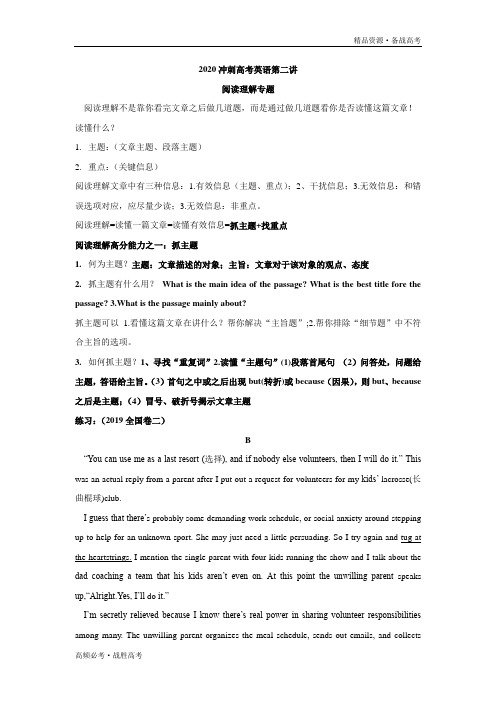
2020冲刺高考英语第二讲阅读理解专题阅读理解不是靠你看完文章之后做几道题,而是通过做几道题看你是否读懂这篇文章!读懂什么?1.主题:(文章主题、段落主题)2.重点:(关键信息)阅读理解文章中有三种信息:1.有效信息(主题、重点);2、干扰信息;3.无效信息:和错误选项对应,应尽量少读;3.无效信息:非重点。
阅读理解=读懂一篇文章=读懂有效信息=抓主题+找重点阅读理解高分能力之一:抓主题1.何为主题?主题:文章描述的对象;主旨:文章对于该对象的观点、态度2.抓主题有什么用?What is the main idea of the passage? What is the best title fore the passage?3.What is the passage mainly about?抓主题可以 1.看懂这篇文章在讲什么?帮你解决“主旨题”;2.帮你排除“细节题”中不符合主旨的选项。
3.如何抓主题?1、寻找“重复词”2.读懂“主题句”(1)段落首尾句(2)问答处,问题给主题,答语给主旨。
(3)首句之中或之后出现but(转折)或because(因果),则but、because 之后是主题;(4)冒号、破折号揭示文章主题练习:(2019全国卷二)B“You can use me as a last resort (选择), and if nobody else volunteers, then I will do it.” This was an actual reply from a parent after I put out a request for volunteers for my kids’ lacrosse(长曲棍球)club.I guess that there’s probably some demanding work schedule, or social anxiety around stepping up to help for an unknown sport. She may just need a little persuading. So I try again and tug at the heartstrings. I mention the single parent with four kids running the show and I talk about the dad coaching a team that his kids aren’t even on. At this point the unwilling parent speaks up,“Alright.Yes,I’ll do it.”I’m secretly relieved because I know there’s real power in sharing volunteer responsibilities among many. The unwilling parent organizes the meal schedule, sends out emails, and collectsmoney for end-of-season gifts. Somewhere along the way, the same parent ends up becoming an invaluable member of the team. The coach is able to focus on the kids while the other parents are relieved to be off the hook for another season. Handing out sliced oranges to bloodthirsty kids can be as exciting as watching your own kid score a goal. Still, most of us volunteers breathe a sigh of relief when the season comes to a close.That relief is coupled with a deep understanding of why the same people keep coming back for more: Connecting to the community (社区)as you freely give your time,money,skills,or services provides a real joy.V olunteering just feels so good.In that sense, I’m pretty sure volunteering is more of a selfish act than I’d freely like to admit. However, if others benefit in the process, and I get some reward too,does it really matter where my motivation lies?24.What can we infer about the parent from her reply in paragraph1?A. She knows little about the club.B.She isn’t good at sports.C.She just doesn’t want to volunteer.D.She’s unable to meet her schedule.25.What does the underlined phrase “tug at the heartstrings” in paragraph 2mean?A.Encourage teamwork.B.Appeal to feelings.C.Promote good deeds.D.Provide advice.26.What can we learn about the parent from paragraph 3?A.She gets interested in lacrosse.B.She is proud of her kids.C.She’ll work for another season.D.She becomes a good helper.27.Why does the author like doing volunteer work?A.I t gives her a sense of duty.B.It makes her very happy.C.It enables her to work hard.D.It brings her material rewards.CMarian Bechtel sits at West Palm Beach’s Bar Louie counter by herself, quietl y reading her e-book as she waits for her salad. What is she reading? None of your business! Lunch is Bechtel’s “me” time. And like more Americans, she’s not alone.A new report found 46 percent of meals are eaten alone in America. More than half (53 percent) have breakfast alone and nearly half (46 percent) have lunch by themselves. Only at dinnertime are we eating together anymore, 74 percent, according to statistics from the report.“I prefer to go out and be out. Alone, but together, you know?” Bechtel said, looking up from her book. Bechtel, who works in downtown West Palm Beach, has lunch with coworkerssometimes, but like many of us, too often works through lunch at her desk. A lunchtime escape allows her to keep a boss from tapping her on the shoulder. She returns to work feeling energized. “Today, I just wanted some time to myself,” she said.Just two seats over, Andrew Mazoleny, a local videographer, is finishing his lunch at the bar. He likes that he can sit and check his phone in peace or chat up the barkeeper with whom he’s on a first-name basis if he wants to have a little interaction (交流). “I reflect on how my day’s gone and think about the rest of the week,” he said. “It’s a chance for self-reflection. You return to work recharged and with a pl an.”That freedom to choose is one reason more people like to eat alone. There was a time when people may have felt awkward about asking for a table for one, but those days are over. Now, we have our smartphones to keep us company at the table. “It doesn’t feel as alone as it may have before all the advances in technology,” said Laurie Demeritt, whose company provided the statistics for the report.28. What are the statistics in paragraph 2 about?A. Food variety.B. Eating habits.C. Table manners.D. Restaurant service.29. Why does Bechtel prefer to go out for lunch?A. To meet with her coworkers.B. To catch up with her work.C. To have some time on her own.D. To collect data for her report.30. What do we know about Mazoleny?A. He makes videos for the bar.B. He’s fond of the food at the bar.C. He interviews customers at the bar.D. He’s familiar with the barkeeper.31. What is the text mainly about?A. The trend of having meals alone.B. The importance of self-reflection.C. The stress from working overtime.D. The advantage of wireless technology.DBacteria are an annoying problem for astronauts. The microorganisms (微生物) from our bodies grow uncontrollably on surfaces of the International Space Station, so astronauts spend hours cleaning them up each week. How is NASA overcoming this very tiny big problem? It’s turning to a bunch of high school kids. But not just any kids. It is depending on NASA HUNCH high schoolclassrooms, like the one science teachers Gene Gordon and Donna Himmelberg lead at Fairport High School in Fairport, New York.HUNCH is designed to connect high school classrooms with NASA engineers. For the past two years, Gordon’s students have been studying ways to kill bacteria in zero gravity, and they think they’re close to a solution (解决方案). “We don’t give the students any breaks. They have to do it just like NASA engineers,” says Florence Gold, a project manager.“There are no tests,” Gordon says. “There is no graded homework. There almost are no grades, other than ‘Are you working towards your goal?’ Basically, it’s ‘I’ve got to produce this product and then, at the end of the year, present it to NASA.’ Engineers come and really do an in-person review, and…it’s not a very nice thing at times. It’s a hard business review of your product.”Gordon says the HUNCH program has an impact (影响) on college admissions and practical life skills. “These kids are so absorbed in their studies that I just sit back. I don’t teach.” And that annoying bacteria? Gordon says his students are emailing daily with NASA engineers about the problem, readying a workable solution to test in space.32. What do we know about the bacteria in the International Space Station?A. They are hard to get rid of.B. They lead to air pollution.C. They appear in different forms.D. They damage the instruments.33. What is the purpose of the HUNCH program?A. To strengthen teacher-student relationships.B. To sharpen students’ communication skills.C. To allow students to experience zero gravity.D. To link space technology with school education.34. What do the NASA engineers do for the students in the program?A. Check their product.B. Guide project designs.C. Adjust work schedules.D. Grade their homework.35. What is the best title for the text?A. NASA: The Home of AstronautsB. Space: The Final Homework FrontierC. Nature: An Outdoor ClassroomD. HUNCH: A College Admission Reform语法专题---名词Dear Michelle,I hope everything is fine with you. How is your winter holiday?Recently, I have heard of news on the Internet that a novel coronavirus was found in Central China’s Wuhan city, which has not yet been previously identified in humans. As I remember, you are living in Changsha which is not far from Wuhan, so I am worried about you. Is there any effective treatment for the disease caused by this virus? Do you have enough food, water or face masks? Please fell free to let me know if you need nay help.Please take good care!Best wishes,Victoria名词:表示人事物地点或抽象概念的词。
2020版高考英语精准备考一轮浙江专用版讲义:Book 3 Unit 1 含答案
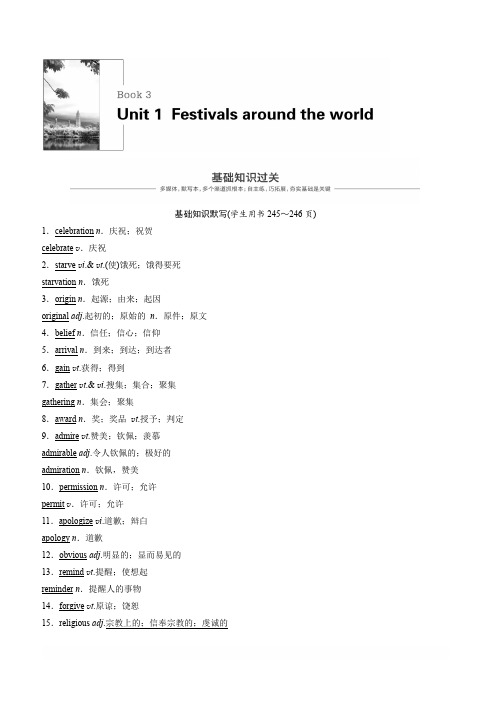
基础知识默写(学生用书245~246页) 1.celebration n.庆祝;祝贺celebrate v.庆祝2.starve v i.& v t.(使)饿死;饿得要死starvation n.饿死3.origin n.起源;由来;起因original adj.起初的;原始的n.原件;原文4.belief n.信任;信心;信仰5.arrival n.到来;到达;到达者6.gain v t.获得;得到7.gather v t.& v i.搜集;集合;聚集gathering n.集会;聚集8.award n.奖;奖品v t.授予;判定9.admire v t.赞美;钦佩;羡慕admirable adj.令人钦佩的;极好的admiration n.钦佩,赞美10.permission n.许可;允许permit v.许可;允许11.apologize v i.道歉;辩白apology n.道歉12.obvious adj.明显的;显而易见的13.remind v t.提醒;使想起reminder n.提醒人的事物14.forgive v t.原谅;饶恕15.religious adj.宗教上的;信奉宗教的;虔诚的religion n.宗教16.independence n.独立;自主independent adj.独立的;自主的17.ancestor n.祖先;祖宗18.feast n.节日;盛宴19.parking n.(汽车等)停放20.drown v t.& v i.淹没;淹死;溺死21.trick n.诡计;恶作剧;窍门v t.欺骗;诈骗22.weep v i.哭泣;流泪n.哭;哭泣23.agriculture n.农业;农艺;农学agricultural adj.农业的;农艺的24.energetic adj.精力充沛的;充满活力的;积极的energy n.能量25.fool n.愚人;白痴;受骗者v t.愚弄;欺骗v i.干傻事;开玩笑adj.傻的foolish adj.愚蠢的;傻的26.take place发生27.in memory of纪念;追念28.dress up穿上盛装;打扮;装饰29.play a trick/tricks on 搞恶作剧;诈骗;开玩笑30.look forward to期望;期待;盼望31.day and night日夜;昼夜;整天32.have fun with玩得开心33.turn up出现;到场34.keep one’s word守信用;履行诺言35.hold one’s breath屏息;屏气36.set off出发;动身;使爆炸37.remind...of...使……想起……38.At that time people would starve if food was difficult to find,especially during the cold winter months. 在那个时代,如果食物难以找到,特别是在寒冷的冬天,人们就会挨饿。
2020版高考英语精准备考一轮浙江专用版讲义:Book 4 Unit 1 Word版含答案
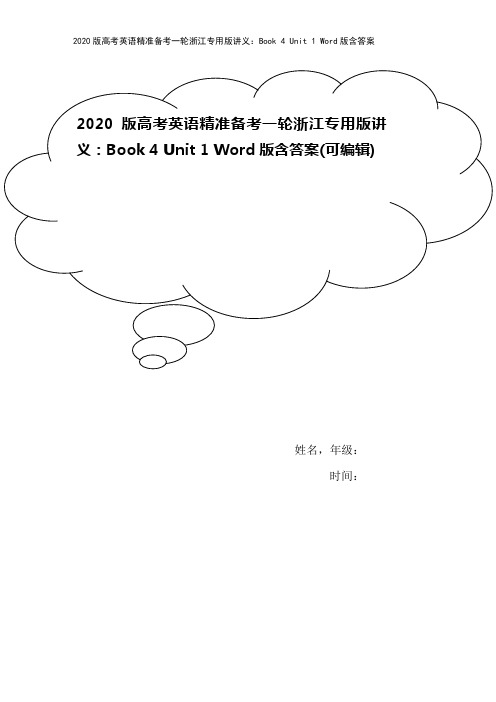
姓名,年级:时间:基础知识默写(学生用书255~256页)1。
achievement n.成就;功绩achieve v。
达到;完成2。
organization n。
组织;机构;团体organize vt。
组织;成立organized adj。
有组织的;有条理的3.behave vt。
& vi。
举动;(举止或行为)表现behavio(u)r n.行为;举止;习性4.shade n.荫;阴凉处vt.遮住光线5。
observe vt.观察;观测;遵守observation n.观察;观测6。
respect vt。
& n.尊敬;尊重;敬意respectable adj.可敬的respectful adj。
恭敬的;表示敬意的7.argue vt。
& vi.讨论;辩论;争论argument n。
争论;争辩;争吵8.crowd n。
人群;观众vt.挤满;使拥挤crowded adj。
拥挤的9。
inspire vt。
鼓舞;激发;启示inspiration n.鼓舞;灵感10.support n.& vt.支持;拥护supporter n.支持者;拥护者11。
refer vi.谈到;查阅;参考reference n.参考;涉及12。
intend vt。
计划;打算intention n.计划;打算13.deliver vt。
递送;生(小孩儿);接生;发表(演说等) delivery n.传送;讲演方式14.welfare n。
福利;福利事业15.project n。
项目;工程;规划16。
specialist n。
专家;专业工作者17.worthwhile adj.值得的;值得做的18.nest n。
窝;巢19.outspoken adj.直言的;坦诚20。
entertainment n。
款待;娱乐;娱乐表演21。
audience n。
观众;听众;读者22.rate n。
速度;比率23。
2020版高考英语精准备考一轮浙江专用版讲义:Book 3 Unit 3

2019年4月基础知识默写(学生用书249~250页)1.novel n.小说;长篇故事adj.新奇的;异常的novelty n.新奇;新奇的事物2.phrase n.短语;词组;惯用语3.scene n.(戏剧)一场;现场;场面;景色4.permit v t.& v i.许可;允许;准许n.通行证;许可证;执照permission n.允许;准许5.stare v i.凝视;盯着看6.spot n.斑点;污点;地点v t.发现;认出spotted adj.有斑点的;有圆点的7.account v t.& v i.认为;说明;总计有n.说明;理由;计算;账目accountant n.会计8.seek v t.& v i.探索;寻求;寻找9.patience n.耐性;忍耐patient adj.有耐心的n.病人10.contrary n.反面;对立面adj.相反的;相违的11.amount n.数量12.rude adj.粗鲁的;无礼的rudeness n.粗鲁;无礼13.manner n.礼貌;举止;方式manners n.礼貌;礼仪14.indeed ad v.真正地;确实;实在15.adventure n.奇遇;冒险adventurous adj.爱冒险的;大胆的16.scream v.尖声叫n.尖叫声;喊叫声17.wander v i.漫游;漫步;漂泊18.pavement n.人行道19.fault n.缺点;过错;故障20.passage n.通道;船费(包括食宿);(一)段21.embassy n.大使馆;大使及其官员22.envelope n.信封23.dessert n.餐后甜点24.genuine adj.真的;真诚的25.bow v.& n.鞠躬;弯腰26.barber n.理发师27.bring up抚养;培养;教育;提出28.go ahead前进;(用于祈使句)可以;往下说29.by accident 偶然;无意中;不小心30.stare at凝视;盯着看31.account for是……的原因;解释32.on the contrary与此相反;正相反33.a large amount of许多;大量34.take a chance冒险35.in rags 衣衫褴褛36.as for关于;至于37.from the bottom of one’s heart 发自内心38.Well,towards nightfall I found myself carried out to sea by a strong wind.嗯,夜晚来临的时候,我发现自己被一阵强风刮到了海里。
2020版高考英语精准备考一轮浙江专用版讲义:Book 8 Unit 3
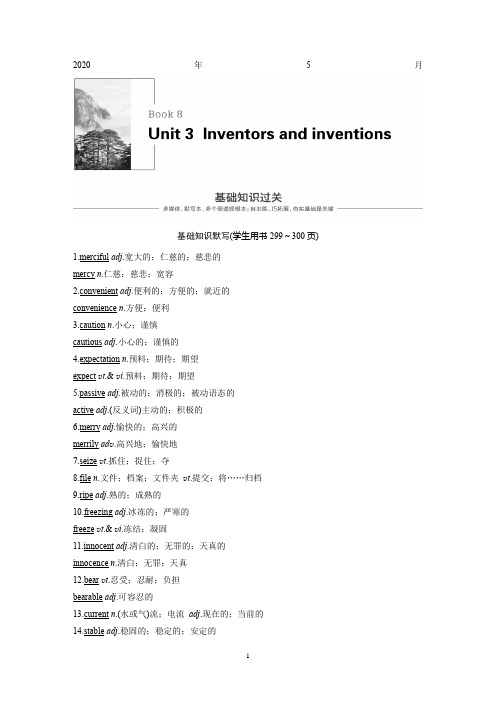
2019年4月基础知识默写(学生用书299~300页)1.merciful adj.宽大的;仁慈的;慈悲的mercy n.仁慈;慈悲;宽容2.convenient adj.便利的;方便的;就近的convenience n.方便;便利3.caution n.小心;谨慎cautious adj.小心的;谨慎的4.expectation n.预料;期待;期望expect v t.& v i.预料;期待;期望5.passive adj.被动的;消极的;被动语态的active adj.(反义词)主动的;积极的6.merry adj.愉快的;高兴的merrily ad v.高兴地;愉快地7.seize v t.抓住;捉住;夺8.file n.文件;档案;文件夹v t.提交;将……归档9.ripe adj.熟的;成熟的10.freezing adj.冰冻的;严寒的freeze v t.& v i.冻结;凝固11.innocent adj.清白的;无罪的;天真的innocence n.清白;无罪;天真12.bear v t.忍受;忍耐;负担bearable adj.可容忍的13.current n.(水或气)流;电流adj.现在的;当前的14.stable adj.稳固的;稳定的;安定的15.associate v t.联想;联系n.同伴;伙伴association n.联盟;社团;联想16.practical adj.实际的;实践的;实用的practically ad v.实际上;事实上practice v t.& v i.& n.实践;练习17.tap v t.& v i.轻打;轻拍;轻敲n.轻轻地敲击(声);(水)龙头18.abrupt adj.突然的;意外的19.valid adj.有效的;确凿的20.string n.线;绳子;一串21.identification n.鉴定;辨认;确定;身份证明22.directory n.电+话簿;商行名录23.dynamic adj.充满活力的;精力充沛的;动态的;发展变化的24.straw n.稻草;麦秆;饮料吸管25.extension n.电+话分机;扩大;延伸26.distinguish v i.& v t.显示……的差别;使……有所不同;辨别distinguished adj.卓越的;杰出的;著名的;高贵的;有尊严的27.c-o/mpetence n.能力;胜任;本领competent adj.能胜任的;有能力的;称职的28.call up给……打电+话29.now and then偶尔;有时30.set about开始;着手31.dive into迅速把手伸入;一心投入32.set out (to do)开始(做)33.hang on不挂断;稍等;紧紧握住34.out of order次序颠倒;发生故障35.get through设法联系上(尤指打通电+话);(设法)做完;通过36.ring back回复电+话37.ring off挂断电+话38.Prepared with some research findings,I decided on three possible approaches:...经过一番研究准备之后,我决定了三种可能的方法:……39.The criteria are so strict that it is difficult to get new ideas accepted unless they are truly novel. 专利标准是很严格的,除非新的想法真是新颖的,否则很难被接受。
2020版高考英语精准备考一轮浙江专用版讲义:Book 7 Unit 2
2019年4月基础知识默写(学生用书287~288页)1.desire n.渴望;欲望;渴求v t.希望得到;想要desirable adj.值得拥有的;可取的2.satisfaction n.满意;满足;令人满意的事物satisfy v t.使满意;使满足satisfied adj.感到满意的;感到满足的satisfying/satisfactory adj.令人满意的;令人满足的3.alarm n.警报;惊恐v t.使警觉;使惊恐;惊动alarming adj.使人害怕的alarmed adj.害怕的4.favour n.喜爱;恩惠v t.喜爱;偏袒favourable adj.有利的;赞许的5.accompany v t.陪伴;伴奏company n.公司;陪伴6.clerk n.售货员;职员;旅馆接待员7.declare v t.宣布;声明;表明;宣称8.envy v t.忌妒;羡慕envious adj.羡慕的;嫉妒的9.junior adj.较年幼的;资历较浅的;地位较低的n.年少者;晚辈;等级较低者10.talent n.天才;特殊能力;才干talented adj.有才能的11.thinking n.思想;思考thought n.想法12.divorce n.离婚;断绝关系v t.与……离婚;与……脱离13.obey v t.& v i.服从;顺从disobey v t.& v i.不服从;违抗14.assessment n.评价;评定assess v t.评价;评定15.sympathy n.同情(心)sympathetic adj.同情的;有同情心的16.fiction n.小说;虚构或想象出来的事17.elegant adj.优雅的;高雅的;讲究的18.scan v t.细看;仔细检查;粗略地看;浏览;扫描19.counter n.柜台;计数器20.awful adj.极坏的;极讨厌的;可怕的;(口语)糟透的21.affair n.事务;事情;暧昧关系22.digital adj.数字的;数码的;手指的;脚趾的23.grand adj.大的;豪华的;雄伟的24.affection n.喜爱;爱;感情25.holy adj.神的;上帝的;圣洁的26.staff n.全体员工;手杖27.chapter n.章;篇;回28.test out考验出;检验完29.reach for伸手去够30.ring up给……打电+话31.turn around转身;翻转32.leave...alone不管;别惹;让……一个人待着;和……单独在一起33.set aside将……放在一边;为……节省或保留(钱或时间)34.in all一共;总计35.be bound to一定做……36.search for搜寻37.take...seriously认真对待……38.As she turned around,there stood Gladys Claffern.她刚一转过身去,就看到格拉迪斯·克拉芬站在那里。
2020版高考英语精准备考一轮浙江专用版讲义:Book 7 Unit 4
2019年4月基础知识默写(学生用书291~292页)1.muddy adj.泥泞的;泥土般的mud n.泥2.weekly adj.& ad v.每周(的)3.relevant adj.有关的;切题的4.remote adj.遥远的;偏僻的5.adjust v i.& v t.调整;(使)适合adjustment n.调整;适合adjustable adj.可调节的6.participate v i.参加;参与participation n.参加participant n.参加者7.otherwise conj.否则;不然ad v.用别的方法;其他方面8.arrangement n.安排;排列arrange v.安排9.donate v t.捐赠donation n.捐赠10.voluntary adj.自愿的;志愿的;无偿的volunteer n.志愿者v.自愿做11.anniversary n.周年纪念(日)12.seed n.种子;萌芽13.political adj.政治的;政党的politics n.政治politician n.政治家14.distribute v t.分配;分发distribution n.分配;分发;分布状态15.operate v i.工作;运转v t.操作operation n.运转;手术operator n.操作员16.fortnight n.两星期17.concept n.观念;概念18.platform n.台;平台;讲台;月台19.sniff v.嗅;闻;用鼻子吸20.privilege n.特权;特别优待21.astronaut n.宇航员;太空人22.angle n.角;角度23.catalogue n.目录24.purchase v t.& n.买;购买25.trunk n.树干;躯干;大衣箱26.clinic n.门诊部;小诊所27.click v i.& v t.(使)发出咔嗒声n.咔嗒声28.security n.安全;保护;保障secure v t.使安全;保卫adj.安全的29.hear from接到……的信30.(be) dying to极想;渴望31.up to到达(某数量、程度等);取决于32.the other day不久前的一天33.be relevant to与……有关34.participate in参加,参与35.dry out(使浸水等之物)完全变干;干透36.dry up(指河流、井等)干涸37.in need在困难中;在危急中38.Sometimes I wonder how relevant chemistry is to these students,most of whom will be going back to their villages after Year 8 anyway.有时我在想化学和这些学生有何关联,反正8年级之后他们中的大多数会回到他们的村子里(生活)。
第三讲完形填空专题-浙江省台州市书生中学高三英语冲刺课讲义
2020冲刺高考英语第三讲完形填空专题完形填空突破法:1.语篇理解能力:锻炼阅读能力,抓主旨,建构并融入语境;2.逻辑推理能力:训练完型思维,掌握解题原则,熟悉微技能;3.语言知识能力:落实考纲词汇,熟词生义,一词多义,语境中活用词汇,常见短语搭配;4.人文素养能力:扩大阅读面,广泛涉猎各种知识,注意中西方文化存在的差异,用好真题文本。
方法:无选项语篇填词法1.快速浏览文章把握语篇主线(语篇结构,语篇主题,首尾段,段首句)---把握语篇主线2.运用微技能从文中挖掘解题线索,语感填词在空格处(可以一空多词)---挖掘解题线索3.全部完成后,再对比选项,根据语境选出最佳答案2015 全国卷1My kids and I were heading into the supermarket over the weekend. On the way ,we spotted a man holding a piece of paper that said, “ __41___ my job. Family to Feed.”At this store, a __42___ like this is not normal. My 10-year-old noticed him and make a __43____ on how bad it must be to have to stand ___44____ in the cold wind.In the store, I asked each of my kids to __45___ something they thought our “friend” there would ___46___. They got apples, a sandwich and a bottle of juice. Then my 17-year-old suggested giving him a ___47____. I thought about it. We were ___48__ on cash ourselves, but…well, sometimes __49___ from our need instead of our abundance is ___50__ what we need to do! All the kids __51____ something they could do away with for the week.When we handed him the bag of __52__, he lit up and thanked us with ___53__ eyes. When I handed him the gift card, saying he could use it for __54____his family might need, he burst into tears.This has been a wonderful ___55__ for our family. For days the kids have been looking for others we can __56___! Things would have played out so __57____ if I had simply said, “No, we really don’t have ___58___ to give more.” Stepping out not only helped a brother in __59___, it also gave my kids the __60____ taste of helping others. It’ll go a long way with them.1.把握文章主线(语篇结构,语篇主题,首尾段,段首句)Main idea___________________________________________________________2.挖掘解题线索请利用微技能,标出上面空格中所填词的原文依据,并标题号标注到相应的微技能处微技能1:首句线索___________________________________________________________微技能2:语境线索___________________________________________________________微技能3:逻辑线索___________________________________________________________微技能4:词汇线索___________________________________________________________微技能5:感情线索___________________________________________________________微技能6:常识线索___________________________________________________________2015全国卷选项41. A. Lost B. Changed C. Quit D. Finished42. A condition B. place C. sight D. show43. A. suggestion B. comment C. decision D. call44. A. outside B. proudly C. by D. angrily45. A. draw B. say C. arrange D. pick46. A. order B. supply C. appreciate D. discover。
2020版高考英语精准备考一轮浙江专用版讲义:Book 8 Unit 4
2019年4月基础知识默写(学生用书301~302页)1.adaptation n.适应(性);改编本adapt v t.(使)适应;改编2.hesitate v i.犹豫;踌躇hesitation n.犹豫;踌躇3.troublesome adj.带来麻烦的;使人心烦的4.outcome n.结果;效果5.mistaken adj.(见解或判断上)错误的;不正确的mistake v t.弄错;误解n.错误;过失;误会6.classify v t.把……分类;把……归类7.condemn v t.谴责;使……处于不幸(不愉快)的状态8.handful n.一把;少量9.remark n.谈论;言论;评述v t.& v i.谈论;评论;说起10.fortune n.机会;运气;大笔的钱fortunate adj.幸运的;侥幸的11.status n.身份;地位;职位12.superior adj.优秀的;较高的;上级的n.上级;长官13.rob v t.抢劫;盗窃;剥夺robber n.强盗robbery n.抢劫14.musical adj.音乐的;喜爱音乐的n.音乐喜剧musician n.音乐家15.overlook v t.俯视;忽视;不理会16.effective adj.有效的effect n.影响;效果17.classic adj.经典的;第一流的n.经典著作18.whistle v i.吹口哨;发出汽笛声n.口哨声;汽笛声19.antique n.文物;古董;古玩adj.古时的;珍贵的20.acquaintance n.相识;了解;熟人acquaint v t.使认识;使了解21.plot n.情节;阴谋22.extraordinary adj.不同寻常的;非凡的23.shabby adj.破旧的;寒酸的24.referee n.裁判员;仲裁者25.c-o/mpromise n.& v i.妥协;折衷26.fade v i.& v t.(使)褪色;减弱;逐渐消失27.disgusting adj.使人反感的;令人厌恶的disgusted adj.厌恶的;厌烦的disgust v t.使作呕;使厌恶n.作呕;厌恶28.pass...off as...(把某人)改变或冒充成……29.make one’s acquaintance结识;与……相见30.generally speaking一般来说31.in terms of...就……来说;从……角度32.rob sb.of sth.抢劫某人某物33.in amazement震惊;惊讶34.show...in带或领……进来35.once more再一次36.in need of...需要……37.fade out(声音、画面)逐渐模糊;渐淡38.Will that be of any use to you? 那对你有用吗?39.Henry Higgins and Colonel Pickering are sitting deep in conversation.亨利·希金斯与皮克林上校正坐着进行深入的交流。
- 1、下载文档前请自行甄别文档内容的完整性,平台不提供额外的编辑、内容补充、找答案等附加服务。
- 2、"仅部分预览"的文档,不可在线预览部分如存在完整性等问题,可反馈申请退款(可完整预览的文档不适用该条件!)。
- 3、如文档侵犯您的权益,请联系客服反馈,我们会尽快为您处理(人工客服工作时间:9:00-18:30)。
2020冲刺高考英语第一讲一、高考关键词+应用场景举例1. abuse 滥用药物_______________pulsory 义务劳动____________________3.concrete 取得实质性进展_________________4.conduct 举止端庄得体_____________________5.conscience 你的良心不会痛吗?______________________________6.discourage 给我泼冷水__________7. evident其危险性不言而喻_________________ 8. fantastic 那些奇思妙想___________________ 9.makeup 浓妆艳抹的_____________________10. offend 他的信口开河得罪了很多人__________________11 particular 挑三拣四__________________ 12.perform 履行职责/义务___________________ 13. pose 别给我出难题____________________14 plain 一个其貌不扬的女孩______________________15 remain 农药残留物____________________ 16. scan 扫码支付______________________二、基本功---“庖丁解牛”说英语英语和汉语到底像不像--我是个学生I am a student.(这个句子几乎完全一样)--我是书生中学的学生。
I am a student of Sunson Middle School.---我爱你。
I love you.---我在心中爱你. I love you in my heart.---这是一朵花。
This is a flower.这是公园里的一朵花。
This is a flower in the park.中英文的主干成分:汉语和英语基本一致(主谓宾、主系表)。
英语中有若干固定句型, 如:学习英语是很重要的。
It is+adj. +for sb. to do;There be结构修饰成分:汉语多“前修”,而英语... top student I really love you. 短的修饰成分通常放在被修饰词的前面(二短:形容词、副词)。
有较长修饰成分时,放被修饰词后面。
把握英语句子,关键在于把握“较长修饰成分” ---(三长:介词短语,从句,非谓语动词)“三长之一”1.介词短语:从介词开始到名词结束,表达一个独立的完整的含义的结构。
at home; in the school, beyond my wildest dream;during my happy childhood; over the last few years. (After chatting) (with Laura) (on this matter) (for two hours) (from 2:00 to 4:00) (in the afternoon), I returned (to my office).“三长之二” 2、从句:由引导词引导的主谓结构。
结构:引导词+主语+谓语(+宾语)“三长之三”:3、非谓语动词短语(to do; doing; done)结构:非谓语动词+名词(+副词)二、英语“进化论”及规律总结,关于“平行并列结构”---This is a tiger. ---This is a big tiger. ---This is a tiger on the grass.----This is a tiger that I saw before.---This is a tiger (which is) running to the forest.非谓语动词短语就是“从句的简化版”长难句解密:1.LiHua is a teacher teaching English in Beijing which is the capital of China.2.They will be able to clear away the mystery of mathematics and face their studies with more confidence than ever imagined.3.The multiplication tables(乘法口诀表) are an exception to the general rule that we forget rather quickly the things that we learn in school, because they are another of the things we overlearn in childhood.关于平行并列结构:由并列词and\or\but\as well as\not only...but also..\both...and...连接;含义相似、结构相同的东西都能并列。
读句子时要注意识别到底谁跟谁并列。
名词并列:Tom and Jerry are friends. 形容词并列:Mr. Smith is a kind, patient and knowledgeable.介词短语并列And that government of the people, by the people and for the people shall not perish from the earth.三、必杀技:“组件分析”三步法给三长加括号,给并列词加方框,给并列项(A和B)加三角。
先找B再找AExercise:In an effort to prevent language loss, scholars from a number of organizations, including UNESCO and National Geographic,have for many years been recording dying languages and the culture which they reflect.1.Many scholars are making efforts to ______A.promote global languages.B. rescue the disappearing languages.C. search for languages communities.D. set up languages research organizations.2. _________When you have bought a fish and arrive home, you’d better store the fish in the refrigerator if you don’t cook it immediately (2016年全国三卷7选5阅读)A、When buying fish, you should first smell it.B、The fish will go bad within hours.C、Do not buy it.D、The easiest is to steam it.E、This is how you can do it.F、It requires a little knowledge.G、The fats in fish are thought to help prevent heart disease.3、Pedestrian(行人) deaths went down by 12% from 5449 in 1996 to 4784 in 2006. But among those in 2006, 471 were killed in crosswalks, down slightly from 488 ten years earlier, the National Highway Traffic Safety Administration (NHTSA) says.What does the report from NHTSA suggests?A. Fewer people were injured in crosswalks.B. Crosswalk safety has been greatly improved.C. Much has been done to reduce traffic accidents.D. Pedestrian deaths in crosswalks remain a serious problem4、Delighted as I was by the tomatoes in sight, my happiness deepened when I learned that Brown’s Grove Farmis one of the suppliers for Jack Dusty, a newly opened restaurant at the Sarasota Ritz Carlton, where —— luckily for me —— I was planning to have dinner that very night.What was the author going to do that evening?_____________A. Go to a farmB. Check into a hotelC. Eat in a restaurantD. Buy fresh vegetables阅读理解CAs data and identity theft becomes more and more common, the market is growing for biometric (生物测量) technologies —like fingerprint scans —to keep others out of private e-spaces. At present, these technologies are still expensive, though.Researchers from Georgia Tech say that they have come up with a low-cost device (装置) that gets around this problem: a smart keyboard. This smart keyboard precisely measures the cadence (节奏) with which one types and the pressure fingers apply to each key. The keyboard could offer a strong layer of security by analyzing things like the for ce of a user’s typing and the time between key presses. These patterns are unique to each person. Thus, the keyboard can determine people’s identities, and by extension, whether they should be given access to the computer it’s connected to — regardless of whether someone gets the password right.It also doesn’t require a new type of technology that people aren’t already familiar with. Everybody uses a keyboard and everybody types differently.In a study describing the technology, the researchers had 100 v olunteers type the word “touch” four times using the smart keyboard. Data collected from the device could be used to recognize different participants based on how they typed, with very low error rates. The researchers say that the keyboardshould be pretty straightforward to commercialize and is mostly made of inexpensive, plastic-like parts. The team hopes to make it to market in the near future.28. Why do the researchers develop the smart keyboard?A. To reduce pressure on keys.B. To improve accuracy in typing.C. To replace the password system.D. To cut the cost of e-space protection.29. What makes the invention of the smart keyboard possible?A. Computers are much easier to operate.B. Fingerprint scanning techniques develop fast.C. Typing patterns vary from person to person.D. Data security measures are guaranteed.30. What do the researchers expect of the smart keyboard?A. It’ll be environment-friendly.B. It’ll reach consumers soon.C. It’ll be made of plastics.D. It’ll help speed up typing.31. Where is this text most likely from?A. A diary.B. A guidebook.C. A novel.D. A magazine.DDuring the rosy years of elementary school (小学), I enjoyed sharing my dolls and jokes, which allowed me to keep my high social status. I was the queen of the playground. Then came my tweens and teens, and mean girls and cool kids. They rose in the ranks not by being friendly but by smoking cigarettes, breaking rules and playing jokes on others, among whom I soon found myself.Popularity is a well-explored subject in social psychology. Mitch Prinstein, a professor of clinical psychology sorts the popular into two categories: the likable and the status seekers. The likables’plays-well-with-others qualities strengthen schoolyard friendships, jump-start interpersonal skills and, when tapped early, are employed ever after in life and work. Then there’s the kind of popularity that appears in adolescence: status born of power and even dishonorable behavior.Enviable as the cool kid s may have seemed, Dr. Prinstein’s studies show unpleasant consequences. Those who were highest in status in high school, as well as those least liked in elementary school, are “most likely to engage (从事) in dangerous and risky behavior.”In one study, Dr. Prinstein examined the two types of popularity in 235 adolescents, scoring the least liked, the most liked and the highest in status based on student surveys (调查研究). “We found that the least well-liked teens had become more aggressive over time toward their classmates. But so had those who were high in status. It clearly showed that while likability can lead to healthy adjustment, high status hasjust the opposite effect on us.”Dr. Prinstein has also found that the qualities that made the neighbors want you on a play date — sharing, kindness, openness — carry over to later years and make you better able to relate and connect with others. In analyzing his and other research, Dr. Prinstein came to another conclusion: Not only is likability related to positiv e life outcomes, but it is also responsible for those outcomes, too. “Being liked creates opportunities for learning and for new kinds of life experiences that help somebody gain an advantage, ” he said.32. What sort of girl was the author in her early years of elementary school?A. Unkind.B. Lonely.C. Generous.D. Cool.33. What is the second paragraph mainly about?A. The classification of the popular.B. The characteristics of adolescents.C. The importance of interpersonal skills.D. The causes of dishonorable behavior.34. What did Dr. Prinstein’s study find about the most liked kids?A. They appeared to be aggressive.B. They tended to be more adaptable.C. They enjoyed the highest status.D. They performed well academically.35. What is the best title for the text?A. Be Nice —You Won’t Finish LastB. The Higher the Status, the BetterC. Be the Best — You Can Make ItD. More Self-Control,Less Aggressiveness三、应用文写作假定你是李华,你校英语协会招聘志愿者,接待来访的国外中学生,请你写信应聘,内容包括:1.口语能力;2.相关经验;3.应聘目的。
